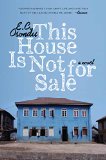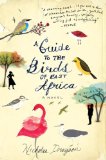Summary | Excerpt | Reviews | Beyond the book | Read-Alikes | Genres & Themes | Author Bio

A Novel
by Ngugi wa Thiong'oNgugi wa Thiong'o is a Kenyan teacher, novelist,
essayist, and playwright, whose writing spans the period from
British colonialism to the current day. His early works were
written in English, which he later abandoned in favor of Gikuyu,
his native tongue. Although he no longer writes in English
he still translates his books into English himself. Wizard
of the Crow, a vast, sprawling, satirical allegory written
in 6 parts, took about 10 years to write and two years to
translate. Critics knowledgeable of his writing have declared
it to be his magnus
opus.
Speaking in an interview last year Wa Thiong'o commented, "When
people talk about Africa, they often only talk about it through
one lens - so they blame its lack of progress on its people, or
its landscape. In this book I wanted to show everything - the
influence of aid, the neocolonialism of capital, and how this
affects things for the people."
Some reviewers feel that Wizard is overly
long, overly repetitious and a tad didactic. When read
from an English/Western perspective there is some justification
for this viewpoint, but it should be remembered that the book
was not written in a Western language or, in the first instance,
for a Western audience, but for a Kenyan audience still familiar
with
the oral tradition - in Kenya, Wa Thiong'o's works are often
read aloud over a period of (many) days.
Did you know?
When Ngugi wa Thiong'o and his second wife, Njeeri, returned
to Kenya in 2004, twenty-four years after he left fearing for
his safety (see sidebar) it was for two happy reasons; to
promote his new book Murogi wa Kagogo (Wizard of the Crow)
and to formalize his marriage to Njeeri with a traditional
wedding ceremony. He felt it safe to return as his old enemy,
President Daniel arap Moi, who had been instrumental in throwing
him into prison in 1977, had eventually been forced to step down
from power in 2004 (although some of the habits of Aburiria's
leader recall those of Daniel arap Moi, Thiong'o insists that he
drew his character from lots of Third World dictatorships
including Mobutu, Idi Amin and Pinochet).
Their trip started wonderfully; wa Thiong'o describes his
arrival at the airport where he was met by crowds "some weeping,
some holding onto books". His wife adds, "some of the books were
covered in dirt .... because they had to bury them - to hide
them - when his books were banned." However, only three
days later things went horribly wrong when intruders broke into
their apartment and raped Njeeri in front of her husband.
When he tried to intervene they burned him with cigarettes.
On leaving hospital together a day later, Ngugi issued a
powerful and humane statement, "We have to keep rising up. The
Kenyans who attacked me do not represent the spirit of the new
Kenya." Messengers soon arrived to warn Njeeri against speaking
out, but neither she nor her husband would comply. Wa Thiong'o
was not to be silenced 24 years ago, and he's not to be silenced
now!
After the violence, his publisher suspended the book tour and
his speaking engagements, but in late August the traditional
wedding ceremony of Ngugi and Njeeri took place in the dusty
village of Mitero in Kenya's Central Province. Speaking during
the ceremony Ngugi said, "There are two things you can never
shed: your age-group and your culture."
![]() This review was originally published in The BookBrowse Review in November 2006, and has been updated for the
September 2007 edition.
Click here to go to this issue.
This review was originally published in The BookBrowse Review in November 2006, and has been updated for the
September 2007 edition.
Click here to go to this issue.

If you liked Wizard of the Crow, try these:

by E.C. Osondu
Published 2016
A vivid, fully imagined portrait of an extraordinary African family and the house that holds them together.

A Guide to the Birds of East Africa
by Nicholas Drayson
Published 2009
A beguiling novel that does for contemporary Kenya and its 1,000 species of birds what Alexander McCall Smith’s Ladies Detective series does for Botswana
Your guide toexceptional books
BookBrowse seeks out and recommends the best in contemporary fiction and nonfiction—books that not only engage and entertain but also deepen our understanding of ourselves and the world around us.